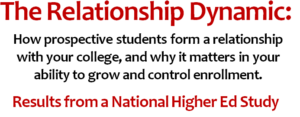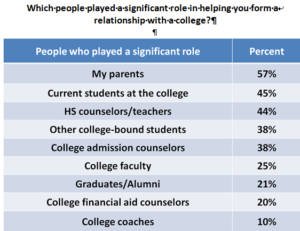Over the next couple of months, thousands of eager newly-admitted students will be stepping onto college campuses across the country to participate in that all-important college orientation.  You already know this is an essential step for your incoming class, but for many students college orientation represents even more significance: It is when and where they will ultimately seal the bond with your school that will ensure they are on campus when school starts.
You already know this is an essential step for your incoming class, but for many students college orientation represents even more significance: It is when and where they will ultimately seal the bond with your school that will ensure they are on campus when school starts.
In our recently released co-sponsored study, “The Relationship Dynamic,” over 12,000 college-bound students opened up to us about the factors that contribute to building a bond with a college that leads to their enrollment. (Click here to download a copy of the full report.) Surprisingly, 21% of college-bound students told us that their 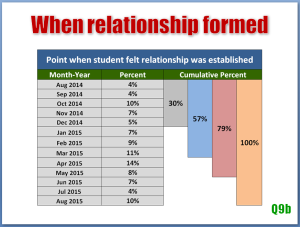 emotional connection to their college of choice (their feeling of having formed a relationship) did not develop until the summer months of June, July and August. More precisely, many of these students said the bond with their chosen college was triggered by specific experiences and relationships realized during orientation.
emotional connection to their college of choice (their feeling of having formed a relationship) did not develop until the summer months of June, July and August. More precisely, many of these students said the bond with their chosen college was triggered by specific experiences and relationships realized during orientation.
Unfortunately, orientation – or any other process we put students through – doesn’t guarantee they’ll show up on the first day of class. The predictor of enrollment is excitement and emotional commitment. Students who don’t feel an emotional attachment to your college are far more likely to melt.
“The Relationship Dynamic” study findings point to specific actions you can take during orientation and beyond to strengthen and maintain the relationships you have worked so hard to build with your admitted students AND create meaningful connections with those students who have yet to bond with your college.
Make this Priority #1
What goals have you established for your orientation program? Do they read like a laundry list of paperwork, must-do’s, must-know’s and must-see’s? Instead, your goals and practices should be developed in the context of, “How does this strengthen (or create) the emotional bond each student has with us?”
By its very nature, college orientation is very process-driven: read this, hear this, watch this … Kudos to those admission teams that have created entertaining programs and activities that engage students, foster enthusiasm, and enable the student to feel what it’s like to be a student and a part of a community.
Have you built in opportunities for admitted students to connect with (not simply meet) other newly-admitted and current like-minded students? Are your programs one-size-fits all or are you constantly searching for and testing new and unique ways to engage with students.
Find out if you have “moved the needle”
Orientation affords yet another opportunity to find out if you are changing or enhancing the student’s perception of your institution. Ideally, you have a chance to ask each student personally, “How was your orientation today? Did you meet some great people? Are you starting to feel like a (insert your mascot, school nickname)?” Based on the answers, your follow up might be “Is there anyone you’d like to meet before school starts?” or, “What would make you feel more comfortable or excited about your decision to enroll here?”
Sometimes that highly personalized interaction is simply not practical due to a high volume of students. However, it is still possible to gauge changes in student enthusiasm. Does your college do a post-orientation survey? We highly-recommend this tool to evaluate your level of service delivery during orientation as well as a channel to identify students who aren’t yet emotionally committed to your college. Be specific. “Did your orientation experience make you feel more connected to our college? Are you more or less excited about attending? What can we do to make your transition to our college better?”
You can maximize your orientation events and minimize summer melt by making this your mantra: Every interaction with a student, in any form, should be measured on the basis of, “Does it make our relationship stronger?”
Get On Board with our Next Co-Sponsored Study!
We know that prospective students don’t always tell us what they really think. Sometimes they don’t want to be completely honest about their REAL first-choice college because they think they’ll hurt our feelings. They often say one thing and do another. Why?
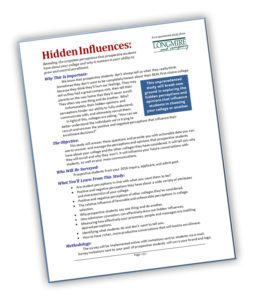 We will answer that critical question in our next co-sponsored study, “Hidden Influences: Revealing the unspoken perceptions that prospective students have about your college and why it matters in your ability to grow and control enrollment.” This unprecedented study will break new ground in exploring the hidden perceptions and opinions that influence students in choosing your college or another. Unlike any other higher education research or non-matric studies, “Hidden Influences” will dive deeply into the emotions and perceptions that factor into the college selection process. This study will provide you with actionable information you can use immediately and effectively.
We will answer that critical question in our next co-sponsored study, “Hidden Influences: Revealing the unspoken perceptions that prospective students have about your college and why it matters in your ability to grow and control enrollment.” This unprecedented study will break new ground in exploring the hidden perceptions and opinions that influence students in choosing your college or another. Unlike any other higher education research or non-matric studies, “Hidden Influences” will dive deeply into the emotions and perceptions that factor into the college selection process. This study will provide you with actionable information you can use immediately and effectively.
For more information or to reserve your participation in this study, contact me at (913) 492-1265, ext. 708 or by email at rmontgomery@longmire-co.com or Bob Longmire at (913) 492-1265, ext. 709, blongmire@longmire-co.com. Colleges are signing up now so we encourage you to contact us soon if you are thinking about participating. CLICK HERE FOR COMPLETE INFORMATION.
We help colleges with their recruiting efforts every day. If we can help you please call or shoot me an email. Continue the conversation on Twitter @LongmireCo. For more information about Longmire and Company and the tools we have to offer, click here. Be sure to subscribe to Versions of Conversion today so you don’t miss any of this highly-valuable information.
 Rick Montgomery is as an Enrollment Strategist at Longmire and Company. With over 20 years in higher education marketing, he brings an innovative and dynamic approach to helping colleges and universities meet their enrollment goals. Rick can be reached at 913/492.1265 x.708 or via email at rmontgomery@longmire-co.com.
Rick Montgomery is as an Enrollment Strategist at Longmire and Company. With over 20 years in higher education marketing, he brings an innovative and dynamic approach to helping colleges and universities meet their enrollment goals. Rick can be reached at 913/492.1265 x.708 or via email at rmontgomery@longmire-co.com.

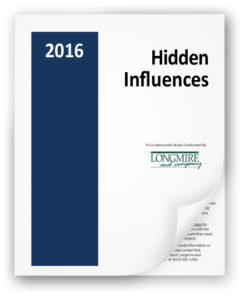
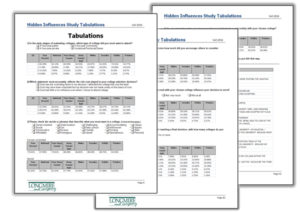

 Bob Longmire is President of Longmire and Company, Inc. He is a recognized expert on the topic of how prospective students and parents form their college selection decisions – and how colleges can use that knowledge to grow and control their enrollment. He can be reached at (913) 492-1265, ext 709 or at
Bob Longmire is President of Longmire and Company, Inc. He is a recognized expert on the topic of how prospective students and parents form their college selection decisions – and how colleges can use that knowledge to grow and control their enrollment. He can be reached at (913) 492-1265, ext 709 or at